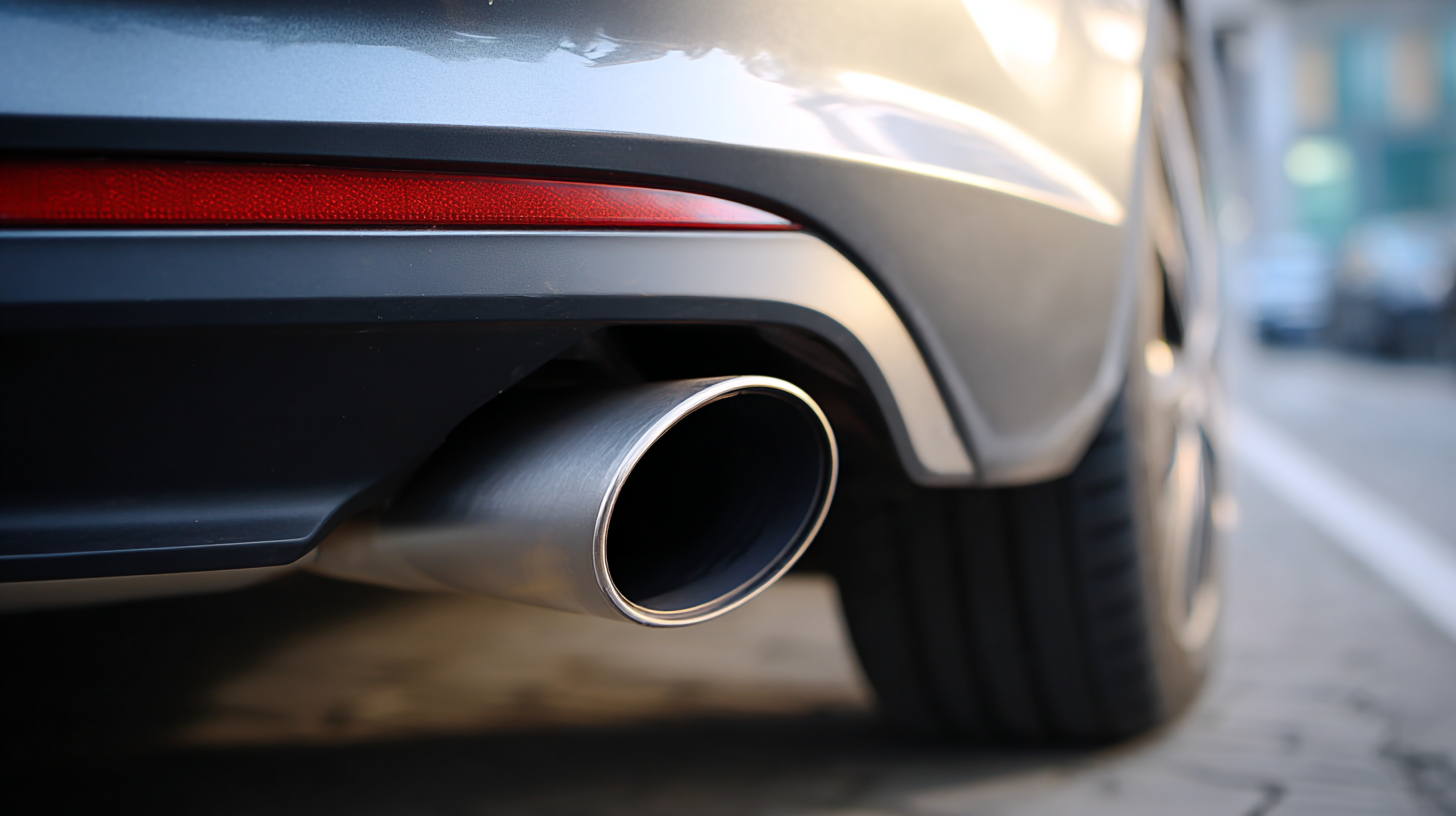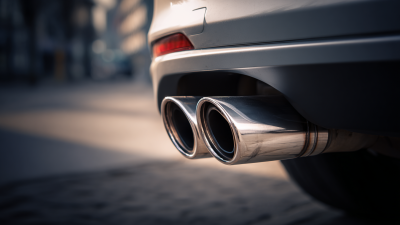Understanding the Importance of Vehicle Exhaust Pipes for Eco Friendly Driving
The vehicle exhaust pipe is a critical component often overlooked in discussions about eco-friendly driving. According to a report from the International Council on Clean Transportation, approximately 29% of greenhouse gas emissions in the transportation sector can be attributed to passenger vehicles, highlighting the urgent need for improvements in emissions control. A well-designed vehicle exhaust pipe plays a significant role in managing these emissions by directing harmful gases away from the engine and reducing pollutants released into the atmosphere. Studies indicate that optimizing exhaust systems can lead to a 10-15% improvement in fuel efficiency, thereby not only enhancing a vehicle’s performance but also contributing to lower environmental impact. As consumers and manufacturers increasingly prioritize sustainability, understanding the importance of vehicle exhaust pipes in promoting eco-friendly driving becomes quintessential for both compliance and environmental stewardship.

The Role of Exhaust Pipes in Reducing Vehicle Emissions: 5 Key Insights
Vehicle exhaust pipes play a critical role in reducing harmful emissions, making them essential for eco-friendly driving. One primary function of exhaust pipes is to channel exhaust gases safely away from the engine and into the atmosphere. This process not only helps in maintaining engine performance but also minimizes the release of toxic substances that contribute to air pollution. By ensuring that these gases are treated correctly—particularly through components like catalytic converters—automakers can significantly reduce the environmental impact of their vehicles.
The growing awareness of environmental issues has driven innovation in exhaust pipe technology. Enhanced designs aim to improve the efficiency of emission control systems, which can lead to lower levels of harmful emissions. As global regulations become increasingly stringent, the automotive industry is likely to witness a surge in demand for advanced exhaust systems that prioritize both performance and eco-friendliness. This shift underscores the importance of investing in high-quality exhaust pipes as a means of promoting sustainable driving and protecting the environment.

Top 3 Eco-Friendly Materials for Vehicle Exhaust Pipes and Their Benefits
The development of eco-friendly materials for vehicle exhaust pipes plays a crucial role in promoting sustainable driving practices. Among these innovative materials, stainless steel stands out for its durability and resistance to corrosion, making it an ideal choice for long-lasting exhaust systems. Not only does stainless steel enhance the lifespan of exhaust pipes, but it also contributes to more efficient exhaust flow, improving vehicle performance and reducing emissions.
Another notable material is aluminum, which offers lightweight properties that can lead to improved fuel efficiency. Aluminum exhaust pipes can significantly reduce the overall weight of the vehicle, allowing for better fuel consumption and decreased greenhouse gas emissions. Additionally, aluminum is highly recyclable, further supporting environmental sustainability by minimizing waste.
Finally, composite materials are emerging as a promising option in the automotive industry. These materials combine various elements to create exhaust pipes that are both lightweight and strong. They provide excellent thermal insulation, which helps in maintaining optimal exhaust temperatures, thereby enhancing engine efficiency. Utilizing composite materials not only advances eco-friendly technology but also supports the shift towards a more sustainable automotive future.

5 Ways Proper Exhaust Pipe Maintenance Contributes to Sustainable Driving
Proper maintenance of vehicle exhaust pipes is crucial for promoting sustainable driving practices. Exhaust pipes play a pivotal role in controlling emissions, which are a significant contributor to greenhouse gas outputs. In urban areas, transport accounts for approximately 25% of total greenhouse gas emissions, with road transport alone responsible for 70% of that segment. Maintaining the integrity of the exhaust system not only reduces harmful emissions but also enhances fuel efficiency, which in turn contributes to lesser carbon footprints.
Regular inspection and maintenance of exhaust systems can prevent leaks and blockages that lead to increased emissions and poor vehicle performance. Additionally, technologies such as selective catalytic reduction (SCR) systems have been developed to enhance exhaust treatment in diesel vehicles. These systems utilize diesel exhaust fluid (DEF) to convert harmful nitrogen oxides into less harmful substances, illustrating just one way that proper exhaust maintenance can support eco-friendly driving initiatives.
Furthermore, the rise of electric vehicles (EVs) marks a significant shift towards reducing dependence on traditional internal combustion engines. EVs contribute to lower carbon emissions by eliminating exhaust emissions altogether. As industries increasingly adopt sustainable practices, the focus on maintaining exhaust systems in combustion vehicles becomes even more relevant—ensuring that they operate efficiently until society fully transitions to greener alternatives.
Understanding the Importance of Vehicle Exhaust Pipes for Eco Friendly Driving
This chart illustrates the impact of proper exhaust pipe maintenance on sustainable driving practices. Maintaining vehicle exhaust systems can significantly reduce emissions and improve fuel efficiency.
The Impact of Exhaust Pipe Design on Fuel Efficiency: 4 Essential Considerations
The design of vehicle exhaust pipes plays a critical role in enhancing fuel efficiency and promoting eco-friendly driving practices. One essential consideration is the diameter of the exhaust pipe, as it directly affects backpressure. A pipe that is too narrow can restrict exhaust flow, leading to a decrease in engine performance and increased fuel consumption. Conversely, an optimally sized exhaust pipe allows for the ideal expulsion of gases, which contributes to better fuel efficiency and lower emissions.
Another vital factor is the material used in the exhaust system. High-quality materials not only provide durability but also help in maintaining optimal exhaust temperature, which can reduce the likelihood of issues related to aftertreatment systems like diesel particulate filters (DPF) and selective catalytic reduction (SCR) components. Additionally, the layout and design of exhaust headers can further influence the overall efficiency of the exhaust system. Proper installation and tuning can prevent future complications, making it crucial for vehicle owners to understand and invest in the right exhaust components to support eco-friendly driving initiatives.
Exploring 7 Innovative Exhaust Technologies for a Greener Future in Vehicles
Innovative exhaust technologies play a crucial role in the shift towards eco-friendly driving. As the automotive industry seeks to reduce emissions and improve fuel efficiency, several cutting-edge solutions have emerged. For instance, active exhaust systems can optimize the back pressure in real-time, enhancing engine performance while minimizing harmful emissions. These systems adjust the exhaust flow based on driving conditions, allowing vehicles to operate more efficiently without sacrificing power.
Another promising innovation is the integration of catalytic converters using advanced materials, which significantly enhance the conversion of harmful gases into less toxic substances. Technologies such as selective catalytic reduction (SCR) and diesel particulate filters (DPF) are paving the way towards achieving stricter emissions standards. Furthermore, electric vehicles utilize innovative designs like heat recovery systems that capture and repurpose exhaust heat, increasing overall energy efficiency. By exploring and implementing these advanced exhaust technologies, the automotive industry moves closer to a greener future, ensuring that driving remains both enjoyable and environmentally responsible.
 +86 17870576410
+86 17870576410

Home
Company Profile
Products
News
Blog
Contact Us
 Contact Number
Contact Number







